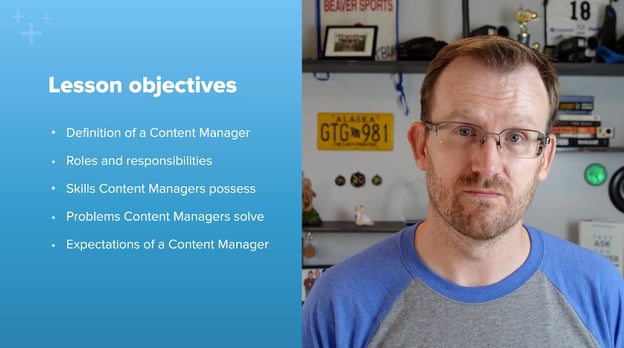Subscribe now and get the latest podcast releases delivered straight to your inbox.
Hire Freelance Writers with Caution (Read this First)

Sep 27, 2021

Perhaps content marketing is a new priority for your company and you’re in the early stages of researching who is going to write for you. Or perhaps you’ve been doing content marketing for a while – but you’re not happy with the content and you’re looking for a new writer.
For many people, their first instinct is to find a cost-effective freelancer to ensure their blogs are published regularly in hopes that Google will like their website and they’ll generate more sales opportunities.
We’ve seen this story play out many times before, and in more cases than not, freelance writers fail to deliver content that moves the needle in the slightest. Sure, the job is done, the articles are published. But the content comes off as generic. It doesn’t capture the spirit of your company, it doesn’t rank, and it doesn’t pull in real customers, who also find it generic and not helpful – if they find it at all.
Companies that have incredible success with content marketing approach content creation very differently.
In this article, we’re going to:
1. Dive deeper into the common problems companies doing inbound marketing experience with freelance writers (or any outsourced writers, for that matter, even from an agency).
2. Show why a model based on freelance writers is doomed from the start.
3. Recommend alternatives if you truly want to see more traffic, more sales opportunities, and new customers from your content marketing investment.
Common problems with freelance writers
The common problems most companies face when finding and hiring freelancers to fulfill their content marketing needs:
- The content often sounds generic: More often than not, a freelance writer or writing service working on content for your website is not supplied with the information or resources they need to create unique, compelling articles. Therefore, they skim the internet to find points they can include in the content they’re producing for you. What they find and include in the articles is gleaned from different businesses’ websites (that are also probably putting out generic content) and the result sounds nothing like the way you and your people talk to customers. Almost every article we’ve seen by a freelance writer looks and feels like the writer has a limited understanding of what they’re talking about and like anyone could have written it. This leads to ...
- People complain that it doesn’t sound right: If you’ve hired a freelance writer to create articles, then you know what I’m talking about. Whether it’s the sales team, the customer service team, or the CEO, the common reaction to articles published by freelancers is “That’s not right” or “That’s not what we do” or “Why the heck are we paying for this?” Instead of helping your business drive more sales and growth, the internal team often looks at the investment in outsourced content production as a huge waste of money.
- It doesn’t rank in Google: Google is a mystery sometimes, sure, but Google is also smart. Your articles are going to rank only if they offer a unique perspective, if the voice of the writing is unique, and if the content has value added to it. Here at IMPACT, we realize that Google is smart enough to know when an article is merely regurgitating something from a previous article either from your site or elsewhere that adds nothing to the conversation. We’ve seen this play out over and over again with our clients who get a significant bump when they use subject-matter experts who know what they’re talking about to create articles. Google values that more.
- It’s not helpful for sales to close deals: We’ve never seen a freelancer work with members of the sales team to create the content they need to close deals, or help the sales team implement that content into their sales process to make them more efficient and close deals faster. It’s a fundamental principle here at IMPACT that content creators and the sales team must work hand-in-hand to close sales from inbound marketing, and it’s not common for freelancers to have this level of interaction with the sales team.
It’s essential that the content providers get the content right.
“Content is the voice of the company expressed through words,” says Jennifer Hoynes, global marketing director of Stratford, Conn.-based Ashcroft Inc., an IMPACT client. “When the content is coming from someone outside of the organization, it can take many iterations to get it right. I have worked with many marketing agencies and freelancers over the 25+ years that I have been in marketing, and content is by far the most challenging aspect of the process, no matter what company or industry I was a part of.

The content for Ashcroft’s blog is managed in-house.
“In my current role, the technical nature of our products and business model are quite complex and difficult to convey through a creative brief or phone interview. Our employees go through product training, visit the factory floor, and attend countless meetings where we discuss different aspects of our business.” Jennifer says. “It’s just impossible to share this wealth of knowledge with an individual who is not a part of the day-to-day interactions.”
Why freelance writers fail
IMPACT+ Coach Chris Marr worked with IMPACT client M. Steinert & Sons of Boston to get their content over the initial outsourcing hurdles.
“They tried to outsource their writing to a freelancer and it didn’t work,” Chris says. “They didn’t have the brand language that the client was really looking for, and even the style of writing didn’t fit. … And it’s very difficult for a freelancer to commit to their client to do some additional training. It almost doesn’t make sense in the freelance world to do that. Usually, they hire you to do the thing you do well, which in this case is writing.
“So, they had a first bad experience and it didn’t really work out. And then they eventually went ahead and hired a full-time writer for the company, which is working out much, much better for them.
“I think that’s a typical scenario for (clients), where it doesn’t work out usually due to not the right fit in writing style, they aren’t able to write the kind of content that we would be looking for, and they’re really not committed to the organization in terms of development, interviewing salespeople, you know, all the work we need to do,” Chris says. “So there’s a lack of commitment across the board to the organization, to development, to committing that extra energy, time, and effort to produce an excellent piece of content.”

M. Steinert & Sons has been successful after moving to in-house writers.
Now that we understand the common problems with freelancers, let’s dive into the reasons these problems exist in the first place.
- We don’t invest the time needed to immerse them into our business: With employees, we onboard them to the company, introducing them to all the key players, walking them through our office and facilities, and instill in them a true understanding of our business and what makes us unique and special. We test them to make sure they understand the business and talk about it the way we want them to. And we do this over the course of weeks or months, giving them all the time it takes to truly absorb everything they need to know. We don’t spend nearly as much time doing the same thing with the people who are writing content that represents our business. And, of course, we won’t – they’re not getting paid for that time when instead we want them to write for us at a few hundred dollars an article.
- Freelance writers rarely have access to our subject matter experts: They don’t have the opportunity to work side-by-side with the people who know our customers’ problems the best: the sales team and client-facing people. This means they’re forced to rely on repurposing content that’s already on the internet, leading to the problems listed above.
“Insiders’ perspective is the most critical factor when it comes to writing for an organization,” Jennifer says. “There are meetings – tons of meetings – where only staff members get the full understanding of any given topic or issue. Unless your freelance writer is working on-site, insider perspective is very difficult to ascertain.
“Whether it’s an interview, follow-up conversation, or impromptu chat, having direct access to the writer is key. There is no interpreting through an account executive or liaison between us and the writer where misunderstandings can happen.”
- Freelance writers have an inherent lack of loyalty and commitment to our companies: Most writers want the writing to be simple, done, and paid for, and often don’t have much interest in the long-term investment the content provides the business. They likely have a bunch of other clients and work on their plate, so being done with an assignment is much more important to them than how well the content they’ve finished writing helps the business.
- And we’re not loyal to freelancers either: Freelancers, by nature, are transient, going from one job to another, and they’re used to the game of not being rehired, over and over again, with jobs that are short-term or an individual assignment. This happens to them all the time. They know that if you were committed long-term, you would hire them full-time and offer them a decent salary, benefits, additional training, and include them in team activities.
What should you do instead? We cover that below.
What to do instead of hiring freelance writers
We’ve made the case that freelance writers are usually not a good option for businesses that want to see more traffic, leads, and sales from their inbound marketing. And having helped hundreds of businesses transform the performance of their content marketing programs, we can definitively tell you what the best companies do differently to get a significantly better return on their inbound marketing investment and spend less money! Doesn’t that sound amazing? It’s not that hard.
1. Hire someone full-time, in-house, to write (and manage) your content: To make this possible, you need to do more than just having the right strategy or getting the buy-in of your sales team. You have to know How to Hire a Content Manager. Your content manager has to:
-
- Own the role and nothing else: The fact is, most businesses would rather dip their toes in the content marketing waters before they dive in. We get that. It’s tempting. But just because something is tempting doesn’t make it a good idea (see: cookies). Here at IMPACT, we’ve been blessed to watch many of our clients demonstrate exceptional success. But for all of these success stories, there is one commonality: Producing great content is a full-time job, and someone has to own it. Whenever we’ve allowed our clients to try this strategy without a true “owner” of the content, it hasn’t worked out. Other priorities got in the way. Production was too slow. The entire team never caught on to the vision.
- Have defined duties: Not only will your content manager ensure content is published regularly without fail but they will also:
-
-
- Obsess over creating high-quality content that accurately reflects the true tone and spirit of your brand.
- Interview your company’s subject matter experts to capture their insights (and your company’s unique perspective) and integrate them into your content.
- Work directly with the sales team and help them integrate content into the sales process, allowing them to close more deals faster.
- Monitor your organic search performance and routinely improve ranking and traffic results.
- Update existing content to ensure it remains relevant and effective.
- Oversee the other areas of your sales and marketing initiatives where content is critical (including your website, email, and social media).
- Work across departments and act as a central contact point between leadership, sales, marketing, and business development.
- Have the essential qualities of a leader: Now that you’re ready to hire a content manager, you must make sure that the hire is good. And when we say “good,” we mean really, really good. But what defines good in this case? What skill sets should you be looking for, especially when you’re seeking to fill this position within your company? Here are what we have found to be the essential qualities to look for every time we help a business hire a content marketing manager.
- They love to write.
- They are skilled editors.
- They have excellent interviewing skills.
- They embrace social media and “get it.”
- They have solid video editing skills.
- They are extremely likeable.
- They understand what makes people tick.
- They are organized and goal-oriented.
- They love analytics, numbers, and measurement.
- They are continually thinking outside the box.
- Be a trained journalist: As you look at those qualities, it’s pretty obvious why the journalism industry has taken content marketing by storm. In fact, almost all the hires for content marketing managers by IMPACT clients come directly from this industry; the majority are recent journalism graduates, ready for work, and perfectly suited to meet this position’s demands at a very reasonable price. Granted, they do need to receive the necessary training to “think like a marketer” and embrace the philosophy of They Ask, You Answer, but there is no question, assuming they are good, about whether they can get the job done.
With so much of this talent available (because of the dying newspaper industry), there is really no excuse for companies not to fill their content marketing positions and start receiving the benefits to their business, brand, and the bottom line immediately. Sure, not every company can afford to hire a full-time content manager. But you can work at your kitchen table, writing content at night. We know that some businesses don’t have a choice. But having seen it work so well with so many clients, we can confidently say that if you do have a choice, you need to get the right people in the right seats from the beginning.
“Our in-house content provider has the same skills as any other writer: journalistic mindset, ability to tell a compelling story, and most importantly, the love of writing – not only for work but for fun, too,” Jennifer says.
-
“Freelance writers didn’t work in my industry because what we do is very technical and the freelance writers weren’t getting it.” — David Larson, Mec-gar USA
1a. What about cost?
If you’re worried about cost, don't be. We’ve found, time and time again, that entry-level journalists work perfectly in this role. As long as you get someone who’s hungry, loves to learn, and wants to prove their worth, you’ll be set up for success. Here’s why it makes so much more financial sense to hire a content manager vs. using freelancers:
-
- Over the course of a year, the cost of a full-time content manager is either equivalent to or less than a year of outsourced blog articles, three times a week.
- With someone owning this full-time, it frees up time for the person who would have otherwise had to deal with the headaches of going back and forth with a freelancer or searching for replacement freelancers, over and over again.
- Outsourced content marketing using freelance writers has proven repeatedly to be ineffective at driving any kind of improvement in traffic, leads, and sales compared to the gigantic improvement our clients see when they have a content manager in place.
2. Train your content manager to create content that drives sales: Once your content manager is on staff, it's essential that you provide them with the right training to set them up for success. Here at IMPACT, we specialize in training content managers and have a wealth of resources at your disposal.
Our courses on this topic will help your team take it to the next level, specifically Your Role as a Content Manager. Also, our coaching and training services are available for hands-on training. For more details, talk to an advisor.

Kevin Phillips' course Your Role as a Content Manager is worth checking out.
3. Integrate your content manager and your sales team: It's critical that your content manager works hand-in-hand with your sales team. You get there by having your content manager overseeing the sharing of that information in discussions with sales, and, ultimately, alongside them. Your in-house content team will know the problems you’re trying to solve and will know the pain points that an outside contributor won’t. Those connections are essential in conveying what your business represents, what it stands for, and the problems your customers need to be solved.
Brainstorm every question you’ve ever been asked by a prospect or customer. Focus on their fears, issues, concerns, and worries. State them on paper exactly as the consumer would ask (or search) them, not the way you (as the business) would state them. Once you’ve completed this list, you have the foundation for your entire digital marketing editorial calendar — be it articles, videos, and so on — to put on your company website.
By doing this, you and your team will identify hundreds, if not thousands, of questions, all of which now need to be addressed and discussed in articles or videos.
If you struggle to come up with these questions, there’s a hard truth behind it: You’ve lost touch with your ideal customer or client. If this is the case, it’s time to get together with your sales team, customer service team, and everyone else, and relearn what your ideal customer wants to know to be able to make an informed buying decision.
What to do next
If this article resonated with you and you want to look further into what hiring a content manager could look like for your business, we encourage you to take these next steps:
- Take our free course, How to Hire a Content Manager.
- Publish a job posting for a content manager using this job description.
- Use our free training inside IMPACT+ or talk to one of our advisors to make sure your new content manager is set up for success.

